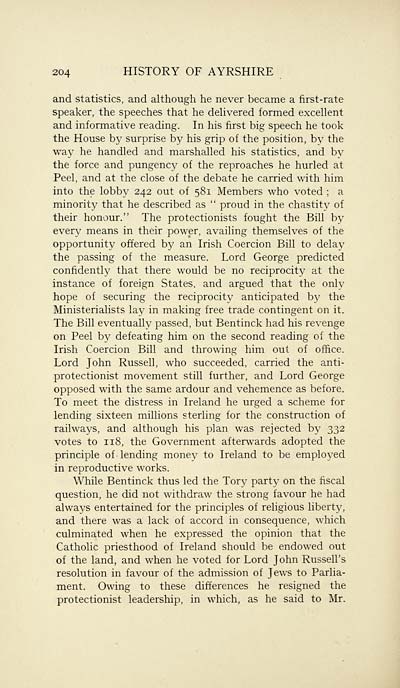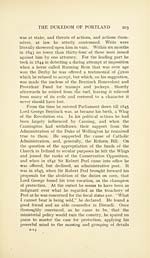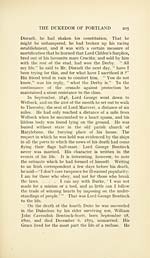Download files
Complete book:
Individual page:
Thumbnail gallery: Grid view | List view

204 HISTORY OF AYRSHIRE
and statistics, and although he never became a first-rate
speaker, the speeches that he delivered formed excellent
and informative reading. In his first big speech he took
the House by surprise by his grip of the position, by the
way he handled and marshalled his statistics, and by
the force and pungency of the reproaches he hurled at
Peel, and at the close of the debate he carried with him
into the lobby 242 out of 581 Members who voted ; a
minority that he described as " proud in the chastity of
their honour." The protectionists fought the Bill by
every means in their power, availing themselves of the
opportunity offered by an Irish Coercion Bill to delay
the passing of the measure. Lord George predicted
confidently that there would be no reciprocity at the
instance of foreign States, and argued that the only
hope of securing the reciprocity anticipated by the
Ministerialists lay in making free trade contingent on it.
The Bill eventually passed, but Bentinck had his revenge
on Peel by defeating him on the second reading of the
Irish Coercion Bill and throwing him out of office.
Lord John Russell, who succeeded, carried the anti-
protectionist movement still further, and Lord George
opposed with the same ardour and vehemence as before.
To meet the distress in Ireland he urged a scheme for
lending sixteen millions sterling for the construction of
railways, and although his plan was rejected by 332
votes to 118, the Government afterwards adopted the
principle of lending money to Ireland to be employed
in reproductive works.
While Bentinck thus led the Tory party on the fiscal
question, he did not withdraw the strong favour he had
always entertained for the principles of religious liberty,
and there was a lack of accord in consequence, which
culminated when he expressed the opinion that the
Catholic priesthood of Ireland should be endowed out
of the land, and when he voted for Lord John Russell's
resolution in favour of the admission of Jews to Parlia-
ment. Owing to these differences he resigned the
protectionist leadership, in which, as he said to Mr.
and statistics, and although he never became a first-rate
speaker, the speeches that he delivered formed excellent
and informative reading. In his first big speech he took
the House by surprise by his grip of the position, by the
way he handled and marshalled his statistics, and by
the force and pungency of the reproaches he hurled at
Peel, and at the close of the debate he carried with him
into the lobby 242 out of 581 Members who voted ; a
minority that he described as " proud in the chastity of
their honour." The protectionists fought the Bill by
every means in their power, availing themselves of the
opportunity offered by an Irish Coercion Bill to delay
the passing of the measure. Lord George predicted
confidently that there would be no reciprocity at the
instance of foreign States, and argued that the only
hope of securing the reciprocity anticipated by the
Ministerialists lay in making free trade contingent on it.
The Bill eventually passed, but Bentinck had his revenge
on Peel by defeating him on the second reading of the
Irish Coercion Bill and throwing him out of office.
Lord John Russell, who succeeded, carried the anti-
protectionist movement still further, and Lord George
opposed with the same ardour and vehemence as before.
To meet the distress in Ireland he urged a scheme for
lending sixteen millions sterling for the construction of
railways, and although his plan was rejected by 332
votes to 118, the Government afterwards adopted the
principle of lending money to Ireland to be employed
in reproductive works.
While Bentinck thus led the Tory party on the fiscal
question, he did not withdraw the strong favour he had
always entertained for the principles of religious liberty,
and there was a lack of accord in consequence, which
culminated when he expressed the opinion that the
Catholic priesthood of Ireland should be endowed out
of the land, and when he voted for Lord John Russell's
resolution in favour of the admission of Jews to Parlia-
ment. Owing to these differences he resigned the
protectionist leadership, in which, as he said to Mr.
Set display mode to:
![]() Universal Viewer |
Universal Viewer | ![]() Mirador |
Large image | Transcription
Mirador |
Large image | Transcription
Images and transcriptions on this page, including medium image downloads, may be used under the Creative Commons Attribution 4.0 International Licence unless otherwise stated. ![]()
| Histories of Scottish families > Ayrshire > Volume 2 > (214) Page 204 |
|---|
| Permanent URL | https://digital.nls.uk/95191666 |
|---|
| Attribution and copyright: |
|
|---|---|
| Description | A selection of almost 400 printed items relating to the history of Scottish families, mostly dating from the 19th and early 20th centuries. Includes memoirs, genealogies and clan histories, with a few produced by emigrant families. The earliest family history goes back to AD 916. |
|---|

